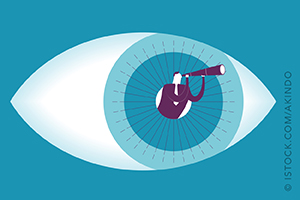
That nagging little voice can sometimes save you from a medical mistake, so don’t ignore it.
Fam Pract Manag. 2020;27(1):38
Author disclosure: no relevant financial affiliations disclosed.

Pat was a 78-year-old patient who didn’t much like going to doctors. Complaints of no energy, a low-grade temperature, and vague right-lower-quadrant pain brought her to see me. She had been having symptoms for five days but was not in any distress. Overall, she looked pretty good; she took no prescription drugs and had a fairly clean medical history. On exam, she had stable vital signs, no fever, a benign abdomen, and a negative urinalysis. She did mention being told she had diverticula on a colonoscopy years before but had never had a bout of diverticulitis.
Wanting to be thorough, I ran her blood and came up with nothing but a white blood cell count that was at the upper limit of normal. “Let’s see where this goes,” I told her, and made her a follow-up appointment for a week later — sooner if necessary.
When she came back, she said she hadn’t been to work in a week because she hadn’t felt well enough. Something was up. Pat never missed work. I performed another exam, and this time she had right-lower-quadrant tenderness. She was still afebrile but said it came on at night. “Pat,” I said, “this could be diverticulitis or perhaps a walled off appendix that may have perforated. Let’s repeat the blood work at the hospital lab and see what’s up. I’ll call you later today with the results.”
Most of my labs get picked up by a courier and the reports come the next day from a reference lab out of town, but I wanted Pat’s results ASAP.
When I returned to the office after lunch, the test results still weren’t among my faxes, so I called the lab to get them. The lab confirmed that they were ready and agreed to fax them. When they didn’t come through despite several attempts, I finally asked, “Can you just tell them to me over the phone?”
The lab tech had a unique accent, and I had a hard time understanding him. “White blood cell count 12.1, C-reactive protein 2.02,” I thought he said. He did not mention any critical values.
I called my patient back. “Pat, I think you may have diverticulitis. I’m going to call in an antibiotic, and I’ll see you in the office tomorrow morning.” She agreed.
The rest of the afternoon I tooled around town doing errands, but something bothered me. A C-reactive protein (CRP) of 2.02 was an unusual value. I was used to getting whole numbers for CRPs or maybe out one decimal place to tenths, but not hundredths. The little man inside told me to reconfirm it, so I went back to my office to see if the fax had arrived. It had. Quickly scanning down, I saw CRP 202!
I tried to call Pat back on her cell, but it went to voicemail, so I left a message, told her about the error, and instructed her to get to the emergency department (ED) where I would give a heads-up to the ED physician. I also called Pat’s work, but she wasn’t there.
Pat soon got my message and went to the ED. Several hours later, I got a call from the ED physician telling me that Pat had an abscess in her ascending colon, probably from infected diverticulum. They were admitting her for IV antibiotics and percutaneous drainage in the morning.
Relieved I hadn’t delayed Pat’s treatment, I thanked the little man inside for being vigilant. Listening to him over the years, I have often erred on the side of caution, but at least I sleep well at night.
